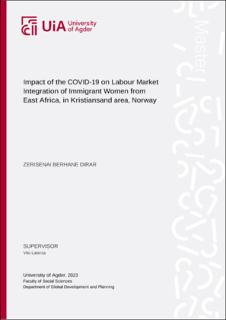| dc.description.abstract | Across the World, in recent years, there has been a significant rise in the number of individuals forced to leave their home countries and seek refuge in other nations due to factors such as persecution, conflict, human rights violations, economic hardship, and political instability. As migration patterns intensify globally, host nations are faced with the challenge of strengthening integration which prioritizes labour integration. The outbreak of the COVID-19 pandemic triggered and impacted the processes of immigration and their integration across the globe. Though the COVID-19 pandemic impacted the whole world, immigrants bear a higher burden of infections and hospitalization in Norway, as compared to non-migrants. Additionally, even without the impact of the global pandemic, immigrant women encounter challenges when it comes to integration into the labour market. Despite the enormous efforts of integration, labour market integration of immigrant women does not seem to be a success, and as the COVID-19 pandemic spread out, subsequent lockdowns have further exacerbated these difficulties in labour market integration.
This paper examines specific challenges and the extent of the impact of the COVID-19 pandemic on the labour market integration of immigrant women from East Africa, in Kristiansand and its region. Following a process perspective, this study utilised a qualitative methods approach with semi-structured interviews. Twenty participants in total were selected using a mixed, purposive and snowball sampling method, and data were collected in Kristiansand, Nodeland, Søgne and Vennesla, which hosts numerous immigrants from East Africa and has an elaborate support network.
Results show that several challenges related to their unemployment and laid-off from their jobs, that the external shock of the pandemic amplified the importance of developing digital skills and learning via the internet and home schooling. In addition, the pandemic exacerbated challenges to their psychological well-being and socializing with the locals. This led to hindering the progress of integration and the human capital and social integration of immigrant women from accessing the labour market. Strengthening the social integration with the locals can facilitate immigrants' access to the local labour market and active integration into society. Challenges such as language proficiency, socio-cultural differences and structural limitations were dominant and constituted a major challenge to their integration into the labour market. | |
